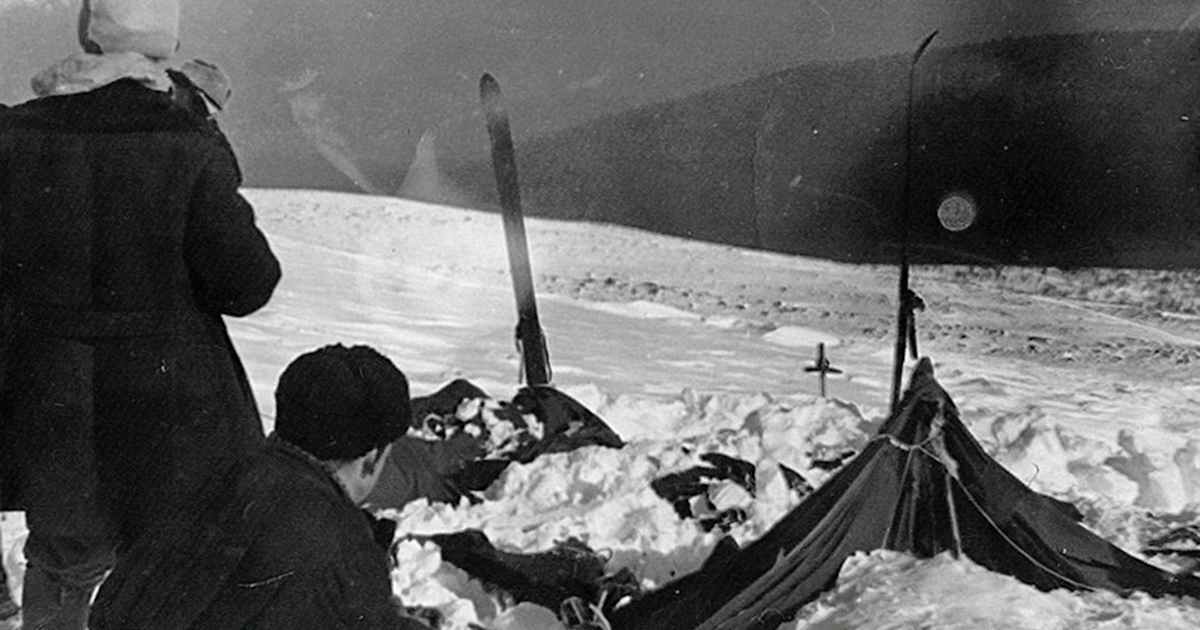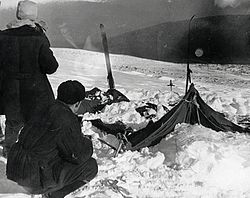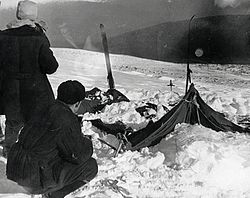In the frigid winter of 1959, a group of nine skilled Soviet hikers embarked on an expedition that would become one of the most perplexing mysteries in mountaineering history. Led by 23-year-old Igor Dyatlov, the team set out with enthusiasm and expertise, planning a challenging ski trek through the treacherous Ural Mountains. Little did they know that their adventure would transform into a haunting enigma that would captivate researchers and the public for decades.
The group consisted of experienced mountaineers, each carefully selected for their skills and determination. Their initial plans seemed straightforward: a challenging winter expedition that would test their limits and showcase their mountaineering prowess. However, the mountains would soon reveal a darkness that no one could have anticipated.

The mysterious tent found at Dyatlov Pass. Credit: History.com
When the hikers failed to return as scheduled, search parties were dispatched into the unforgiving landscape. What they discovered defied all logical explanation. The team’s tent was found slashed open from the inside, suggesting a moment of extreme panic or terror that drove the hikers to cut their way out into the freezing wilderness.

Search party discovering evidence at Dyatlov Pass. Credit: Wikipedia
The bodies were discovered in various locations, scattered across the snow-covered terrain. Some hikers were found partially dressed, a detail that suggested an inexplicable state of desperation. Most chillingly, some bodies bore unusual injuries that medical experts struggled to explain. One hiker was missing their tongue, while others displayed severe chest trauma inconsistent with typical mountaineering accidents.
Researchers have proposed multiple explanations for the mysterious incident. The most scientifically grounded theory suggests a rare slab avalanche could have triggered the hikers’ panic. This hypothesis argues that an unexpected snow movement might have caused the group to flee their tent in terror, leading to their tragic exposure to extreme cold.
Alternative theories range from military testing in the region to more exotic explanations involving UFO encounters. The presence of trace radiation and the military’s swift closure of the investigation have only fueled these speculative narratives. Some researchers point to the geographically unique characteristics of the Ural Mountains, suggesting potential environmental anomalies that could explain the hikers’ inexplicable behavior.
The Dyatlov Pass incident has transcended its historical context to become a global phenomenon. Numerous documentaries, books, and films have explored the tragedy, each offering a unique perspective on the events. Modern technology and advanced research methods continue to revisit the case, hoping to shed light on this enduring mystery.
What makes the Dyatlov Pass incident so compelling is not just the tragic loss of life, but the tantalizing gaps in our understanding. Despite extensive investigations, key questions remain unanswered. Why did the hikers flee their tent? What caused their severe and unusual injuries? The incident remains a testament to the unpredictable and sometimes inexplicable nature of human survival.
References:
Wikipedia – Dyatlov Pass Incident – link
History.com – The Dyatlov Pass Incident – link
Atlas Obscura – The Dyatlov Pass Incident – link
Categories: Historical Mysteries, Mountain Tragedies, True Crime, Unexplained Phenomena, Unsolved Mysteries
Tags: Dyatlov Pass, hiking tragedy, Historical Mysteries, mountaineering mystery, paranormal incidents, Soviet Union, Unexplained Deaths, Ural Mountains
Religion: Secular
Country of Origin: Russia, Soviet Union
Topic: Historical Mystery
Ethnicity: Russian


